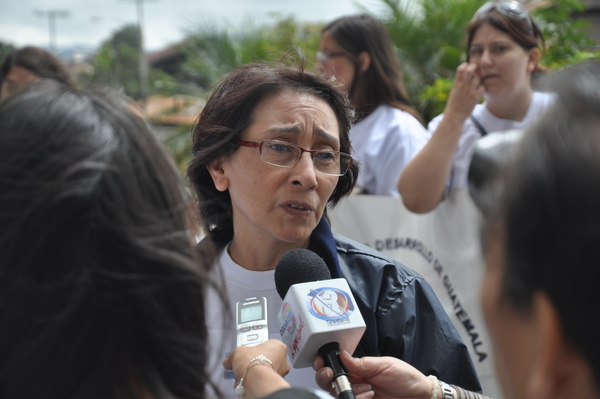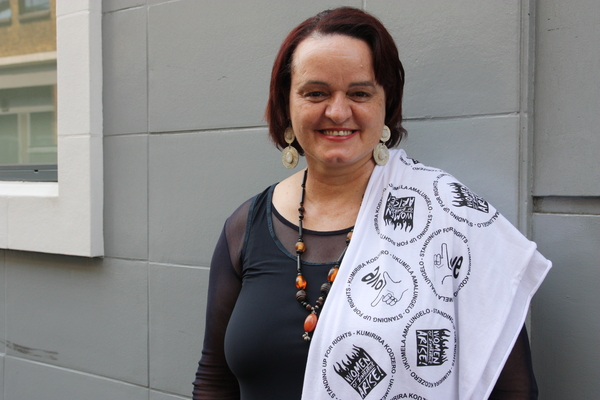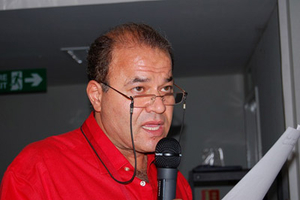
For social justice activists, the speed with which news now crosses the globe creates a tremendous opportunity to respond to human rights issues as they emerge. We can now find out about and alert the world to abuses almost as they happen, and people can act immediately to support human rights defenders and others on the front lines of crises.
However, the sheer number of people who struggle for the most basic human rights can be overwhelming. Although it is easy to get dismayed, we must stay heartened that we can make a difference in an individual’s life even from thousands of miles away.
It is vital that activists who are concerned about abuses outside of their own country continue to fight not just for human rights issues – but for the individuals behind those issues. The issues that concern us – whether violence against women, crackdowns on freedom of expression or assembly, corporate accountability or LGBTI rights – are brought to our attention because of the individuals on the ground who are courageously, and with much risk, advocating for change in their community. Individuals such as Mansour Ossanlu, who was imprisoned and tortured for organizing workers in Iran, Norma Cruz, who is struggling against gender-based violence in Guatemala, and Jenni Williams, who has been arrested more than 50 times for fighting for social and political rights in Zimbabwe.
Forty years ago, Amnesty International launched its Urgent Action Network (UAN) to provide people around the world a mechanism to support such individuals. At that time our groups gathered around a table armed with pen and paper, envelopes and stamps. Volunteers wrote letter after letter, making sure that oppressive governments knew that those they targeted were not alone. Today, while still writing letters, we present these stories to a much broader network of individuals, each of whom can raise their voice and stay informed in real time and with various social media tools.

We dare not minimize the impact of such action – Mansour, Norma, and Jenni all remind us of its power.
First detained in 2005, Mansour Ossanlu was released from Iranian prison in 2011 on a medical furlough. “I spent long periods of time in prison in Iran, solely for my peaceful efforts to organize workers,” Mansour reports. “I was subjected to brutal beatings during my arrests and detentions. I was severely tortured, and even suffered a heart attack. My eyes were damaged during beatings and I was in danger of losing my vision.”
“But Amnesty International activists never forgot me; they flooded the offices and inboxes of Iranian officials with messages, urging that I be released so that I could get the medical treatment I needed. I don’t believe the Iranian authorities would have released me if so many thousands of caring people had not acted on my behalf.”
For her work in support of Guatemala’s survivors of gender violence, Norma Cruz has not only been personally threatened – her daughters and granddaughters have been threatened, as well.
“We work on the cases of 1,500 women per year, assisting in legal, psychological, psychosocial assistance to victims of violence and their families,” she says. “We’re not only confronting abusive spouses and rapists, but also groups involved in organized crime that commit acts of violence against women.I know the risks I face, but am convinced that the work of my foundation is necessary – for Guatemala and for many parts of Latin America. Since Amnesty International issued an Urgent Action on the behalf of my organization and myself we have known that we are not alone. The support of activists around the world not only ensures security for the Foundation but to the victims and families.”

For Jenni Williams, fighting for democratic freedoms in Zimbabwe, the threats have been no less personal.
“Every time I’m arrested, I sit in a prison cell and I expect at any moment to be tortured, raped, or to disappear as I’ve disappeared for days on end before,” says Jenni.
“My global sisters, and Amnesty International are the ones who keep my heart beating and make me feel less worried when I’m sitting doing my national duty in jail. I know that you’re watching over me. A burden shared is a burden halved. Knowing we have some of you sharing this burden with us makes us brave enough to do the work that we are doing.”
Right now, untold thousands are imprisoned around the world for speaking out, peacefully petitioning their governments, or simply for being in the wrong place at the wrong time – a reality with which Ann Burroughs, Amnesty International USA Board Chair, is all too familiar: Arrested in South Africa 27 years ago for protesting apartheid, upon her release she saw the piles of letters that had been sent to the South African government on her behalf.
“Urgent Actions work because they can be activated so rapidly,” Ann says today. “The difference between torture and safety, life and death, can be just a few hours.”
Our 21st century flood of news can sometimes be overwhelming – but behind every story of mistreatment, there is a Mansour, a Norma, a Jenni, or an Ann. A real person, fighting for the kind of rights that we can so easily take for granted.
We have a part to play. Simple actions taken half a world away can literally save lives. New tools and technologies vastly increase our ability to do just that.
